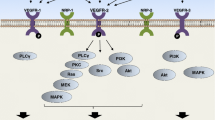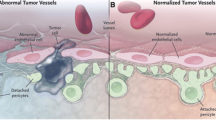Abstract
The effects of vascular endothelial growth factor (VEGF) blockade on the vascular biology of human tumors are not known. Here we show here that a single infusion of the VEGF-specific antibody bevacizumab decreases tumor perfusion, vascular volume, microvascular density, interstitial fluid pressure and the number of viable, circulating endothelial and progenitor cells, and increases the fraction of vessels with pericyte coverage in rectal carcinoma patients. These data indicate that VEGF blockade has a direct and rapid antivascular effect in human tumors.


Similar content being viewed by others
References
Carmeliet, P. & Jain, R.K. Nature 407, 249–257 (2000).
Dvorak, H.F. J. Clin. Oncol. 20, 4368–4380 (2002).
Ferrara, N., Gerber, H.P. & LeCouter, J. Nat. Med. 9, 669–676 (2003).
Kerbel, R. & Folkman, J. Nat. Rev. Cancer 2, 727–739 (2002).
McCarthy, M. Lancet 361, 1959 (2003).
Lee, C. et al. Cancer Res. 60, 5565–5570 (2000).
Yuan, F. et al. Proc. Natl. Acad. Sci. USA 93, 14765–14770 (1996).
Jain, R.K. Nat. Med. 7, 987–989 (2001).
Jain, R.K. Nat. Med. 9, 685–693 (2003).
Wildiers, H. et al. Br. J. Cancer 88, 1979–1986 (2003).
Rafii, S. et al. Nat. Rev. Cancer 2, 826–835 (2002).
Mancuso, P. et al. Blood 97, 3658–3661 (2001).
Monestiroli, S. et al. Cancer Res. 61, 4341–4344 (2001).
Yang, J.C. et al. N. Engl. J. Med. 349, 427–434 (2003).
Teicher, B.A. Cancer Metastasis Rev. 15, 247–272 (1996).
Acknowledgements
This study was supported by two National Cancer Institute grants (R21 CA099237 to C.G.W. and PO1 CA80124 to R.K.J.). D.G.D. is a Cancer Research Institute fellow. R.T.T. is a fellow of the Susan G. Komen Breast Cancer Foundation. We thank T. Lee for his contribution to the CT analysis, M. Ancukiewicz, T.P. Padera and W. Strauss for helpful comments, and J. Tooredman for the ELISAs.
Author information
Authors and Affiliations
Corresponding authors
Ethics declarations
Competing interests
The authors declare no competing financial interests.
Rights and permissions
About this article
Cite this article
Willett, C., Boucher, Y., di Tomaso, E. et al. Direct evidence that the VEGF-specific antibody bevacizumab has antivascular effects in human rectal cancer. Nat Med 10, 145–147 (2004). https://doi.org/10.1038/nm988
Received:
Accepted:
Published:
Issue Date:
DOI: https://doi.org/10.1038/nm988
- Springer Nature America, Inc.
This article is cited by
-
Unleashing the potential of combining FGFR inhibitor and immune checkpoint blockade for FGF/FGFR signaling in tumor microenvironment
Molecular Cancer (2023)
-
Targeted modulation of immune cells and tissues using engineered biomaterials
Nature Reviews Bioengineering (2023)
-
Histological markers, sickle-shaped blood vessels, myxoid area, and infiltrating growth pattern help stratify the prognosis of patients with myxofibrosarcoma/undifferentiated sarcoma
Scientific Reports (2023)
-
New Developments in Treating RAS-Mutated Metastatic Colorectal Cancer
Current Treatment Options in Oncology (2023)
-
Machine learning phenomics (MLP) combining deep learning with time-lapse-microscopy for monitoring colorectal adenocarcinoma cells gene expression and drug-response
Scientific Reports (2022)





